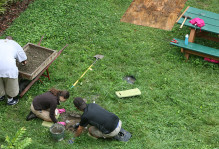Economic Empowerment in a Cup
Last Friday, I was in Washington, DC, for a meeting to learn more about a fair-trade coffee growing cooperative in Haiti. This meeting arose out of the Haiti Compact, a new collective of alternative breaks professionals from five universities around the US and the national alternative breaks nonprofit, Break Away. We came together for an exploratory trip to Haiti in June, looking to discover if – and how – students and universities in the US can productively contribute to rebuilding in Haiti, post-earthquake.
As we were learning about creative projects in Haiti that focus on empowering Haitians and their communities, I learned about Just Haiti. Through phone conversations with their US contact, Kim Lamberty, we arranged to visit La Borde, a small town in the Southern department of Haiti. There, we met with some farmers from the co-operative, learning about their work, their community and how they plan to move forward.
Baraderes, where they live, has long been a center for coffee growing but a price collapse in the 1980’s left the farms bankrupt. Just Haiti works with the farmers to build power among them and develop outlets to sell their fair-trade coffee, paying a respectable wage to the farmers for the intensely difficult work that growing coffee is. As a result, these farmers have access to fair markets as they had not before, and are empowered to make decisions and have agency in their economic lives – unlike most people in Haiti these days.
On Friday, two of my colleagues from the Compact and I met with Kim to learn more about their background, and how we can get other universities in the US connected to support their work. Kim explained the importance of our work with Haiti – as inquisitive scholars and active citizens – with sharp clarity. She said that if you understand what’s happened in Haiti, historically and economically, you have a window into understanding how the Western Hemisphere has developed into its current state. Haiti offers insight into how racism, colonialism and economic oppression affect people and political dynamics, so as we learn more about Haiti’s history, we come to understand the broader dynamics of the past several centuries in the West.
Those are big ideas, and ones that our team will be researching and sharing information about as we develop an alternative break to Haiti this January. But for now, we can all begin advocating for positive change in Haiti – by calling our congress people and advocating for continued US economic support in Haiti. Just Haiti also offers a tangible – and delicious – way to advocate for Haitian economic empowerment: buy their coffee. I’m anxiously awaiting my first shipment of 12 ounces of regular roast, and 12 ounces of Haitian roast. I am excited to know that my little warm cup each morning can now not only be a great way to get centered, but a bold statement of support for people working hard in the fields of Baraderes, Haiti.




No comments.
Comments are currently closed. Comments are closed on all posts older than one year, and for those in our archive.